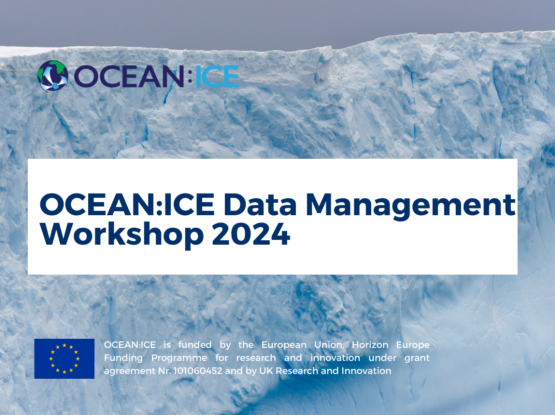OCEAN:ICE Data Management Workshop, held online on the 22nd of May 2024, was a key event for advancing data management practices within the OCEAN:ICE project.
Central to the workshop was the introduction and discussion of the Data Management Plan (DMP), which is mandatory under Horizon Europe and underpins the Open Science framework. The DMP is a living document, evolving over the course of the project, detailing how data is collected, processed, and shared. It ensures the availability and utility of research data, setting guidelines for data deposit and emphasising the importance of using trusted repositories such as NODCs, SEANOE, and PANGAEA, and more. Participants were reminded of the principle "as open as possible, as closed as necessary," encouraging the open sharing of data by default while protecting sensitive information.
The workshop also covered metadata standards and recommendations, which are crucial for ensuring that data is discoverable, accessible, interoperable, and reusable (FAIR principles). Participants were guided on how to provide comprehensive metadata, including details on data collection methods, locations, timestamps, and processing techniques. Emphasis was placed on using standard metadata formats and licenses, preferably CC-BY or CC0, to facilitate open access and proper attribution of data sources.
The OCEAN:ICE data infrastructure was another major topic. The infrastructure comprises several layers, including the application, service, and data layers, which work together to support data management and dissemination. Tools such as ERDDAP(TM), GeoServer, and GeoNetwork were highlighted for their roles in data publishing, metadata harmonization, and providing user-friendly interfaces for data access. The infrastructure aims to support near real-time and delayed mode data management, ensuring that data is quickly available for immediate use and archived for long-term access.
Collaboration and interoperability were key themes throughout the workshop. The project aims to integrate its data management practices with established international programs and infrastructures like SOOS, EMODnet, and the Copernicus Marine Service. This integration is essential for achieving comprehensive and cohesive datasets that can be used by researchers worldwide to study climate change impacts on the ocean and cryosphere.
In addition to technical discussions, the workshop stressed the importance of communication and coordination among project participants. Regular updates and information sharing are necessary to keep the data management process smooth and efficient. The workshop concluded with practical demonstrations of data management tools and platforms, offering participants hands-on experience with systems like ERDDAP and the OCEAN:ICE map viewer. These tools provide advanced features for data discovery, visualisation, and download, supporting the project's goal of making high-quality, well-documented data accessible to the global research community.
Presentation
The recording of the workshop
The author of the article – OCEAN:ICE WP7 (Data management) leader, Antonio Novellino (ETT)


